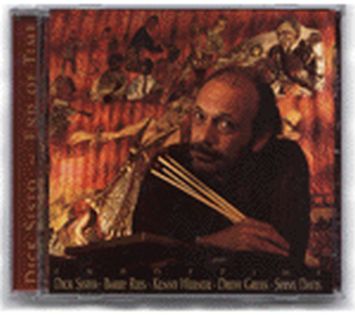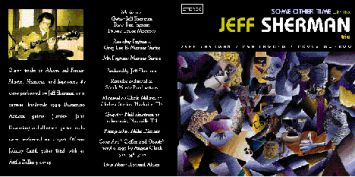social bookmarking tools:
 |
|
| Available RSS Feeds |
|---|
 - Top Picks - Top Picks |
 - Today's Music - Today's Music |
 - Editor's Blog - Editor's Blog
|
 - Articles - Articles
|
Add Louisville Music News' RSS Feed to Your Yahoo!
|
Now Playing in the Lounge. . .
End of Time (ear X-tacy records)
Dick Sisto
Some Other Time (Stork Music Productions)
The Jeff Sherman Trio
Nightclub (Premonition Records/Blue Note)
Patricia Barber



In the liner notes to her recent release Nightclub, Patricia Barber writes, "Something special can happen late at night in a jazz club. As the crowd thins, the musicians intuitively sense that those few who have stayed, have stayed for a reason." What first might come to mind is that the ones who have stayed can't move their liquored-up butts out the door, but that's not the context of Barber's epigram. She is describing the cozy reciprocity that happens when a handful of entranced listeners stay into the early hours for a small jazz ensemble's final set, and of how the ensemble works hard to please its small audience.
It creates the prototypical night of jazz: late night, cigarette smoke gauzing the room, Martell pooled in snifters, couples holding hands under their tables, soft standards floating from the stage.
Three recent jazz releases, two of them from local performers, embody the atmosphere of a jazz lounge during the wee small hours. The first does it with a mix of originals and bold takes on standards, the second does it with an interesting selection of standards and performances that veer from fast to slow, and the third does it (unexpectedly) with bland versions of standards.
End of Time is Dick Sisto's first recording since American Love Song. For this one he's gathered a fine quartet of support with Kenny Werner on piano, Drew Gress on bass, Steve Davis on drums and Barry Ries on trumpet, flugelhorn and drums. Of the three recordings, this is the most un-loungey. All the tracks avoid the verse-chorus-verse-solo template and the performers make a clean use of the space for their solos, particularly in the title cut (written by Sisto). Yet they do so without losing their intimate feel. The material might be best performed in a formal concert (which would most likely happen, since the recording was made at the Kentucky Center for the Arts), but it wouldn't overpower a small audience in a club. Among the outstanding individual contributions on End of Time are Barry Ries's flugelhorn solos, which feather across the tight swing of "Rhythm Thing" and lilt along the cool melody line in "Two Five City." Kenny Werner provides crisp piano solos, especially in "Insider."
In End of Time Dick Sisto has given his performers room to play and material to grow into. Meanwhile, Jeff Sherman and his trio appear to rush through much of their set of standards in Some Other Time. Joined by bassist Ben Ingram and drummer Bruce Morrow, Sherman (jazz guitar instructor at Bellarmine University) has a technical proficiency that goes beyond mastery. But couldn't he slow down and let us enjoy it for awhile?
Some Other Time opens with Sherman's solo guitar giving a pleasant coating to "Always and Forever," one of Pat Metheny's saddest ballads. Sherman's version works and provides the introduction to the rest of the recording, all the way from the smooth cool of "Groove Merchant" to "Heat Wave." The recording does have a few tender moments, especially "I Loves You, Porgy,"Some Other Time," and "Moonlight in Vermont." And no matter what the tempo is throughout the recording, both Ingram and Morrow keep the rhythm tight and light.
To be honest, a trio of guitar, bass and drums doesn't give itself room to stretch out much to play. Still, the trio's proficiency is indisputable. Their sound is balanced and crisp. Yet based on the overall feel of Some Other Time, if this trio were playing the prototypical late night jazz set, it sounds as if they'd be the ones wanting to finish up and get out fast. But the audience might feel the same if they were sitting through a final set containing selections from Patricia Barber's Nightclub.
The Chicago-based Barber, whose Modern Cool and Companion were a pair of the most memorable jazz recordings made during the past two years, has dragged her styled-up dark cloud over a collection of standards in Nightclub only to cut a hole into it to let some dull light through. Is this woman who, in last year's Companion, began her version of "Black Magic Woman" with a chant that brought tingles to your skin – and included a thunderous percussion solo in its bridge – the same woman who now lightly tongues "la-la-la-la-la" in a version of "A Man & A Woman" safe enough to be piped into the lobby of a retirement home? Is the smoldering sexuality of "Silent Partner" from Modern Cool now the timid torchiness of "I Fall in Love Too Easily?" Is the whispery "Touch of Trash," a biting commentary on fashion and deception, now the teary "You Don't Know Me." Listeners familiar with Barber's work will be waiting for the moment when she pulls out the spikes. She doesn't this time. Her versions of the standards are flat and ordinary.
Barber dedicates the recording to her mother, who, she says, introduced her to the music she performs on Nightclub. To be sure, it is heartless to disavow a mother's loving inspiration for anything. There's a commitment inherent in that. But once it's fulfilled, we can pack up the instruments, wipe down the bar, shoo the patrons out (drained of energy and cash – plus they've stayed too long, anyway) and flip the chairs onto the tables. We exit the lounge and walk into the first leak of daylight, fill our lungs with the first full breath of clear air.
And we get another chance to try something new.
